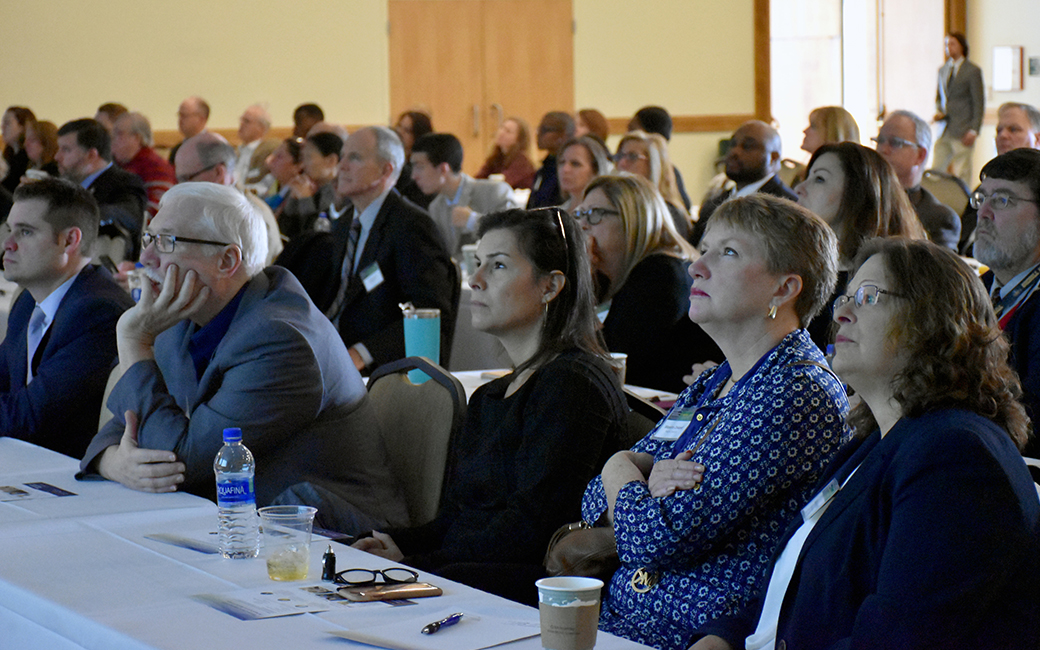RESI forum looks at the economy's wild ride
At annual forum at Towson University, RESI Chief Economist Dr. Daraius Irani predicts a strong economy in 2019 with a slowdown coming in 2020.
By Arthur Smith on November 29, 2018
“The economy is strong and there is growth. However, it’s uneven. There are disparities that need to be addressed.”
That was the key message from the 2018 Economic Outlook Forum hosted by Towson University and the Regional Economic Studies Institute (RESI) on Thursday morning at West Village Commons. Daraius Irani, Ph.D., RESI’s chief economist and vice president of strategic partnerships and applied research at TU, presented his annual, in-depth look at the state of the economy.
Irani began with the good news.
The U.S. is in the second longest economic expansion since World War II and the U.S. jobless rate is holding steady at 3.7 percent — a 49-year low.
Consumer confidence is also at an 18-year high. Last week, over 165 million Americans shopped during Thanksgiving, Black Friday and Cyber Monday, bringing in over $17.8 billion in online sales for the U.S retail market.
“We are a nation of consumers. When we feel confident, we spend money,” said Irani. “We are the only Western country that names shopping days.”

Irani went on to explain challenges facing the U.S. economy, including the current trade war with China, which hurts consumers and companies alike, and an increasing U.S. deficit.
The deficit declined after the recent recovery. Today, it’s beginning to increase and is expected to grow to $1.5 trillion over the next ten years.
“If the deficit continues to grow it becomes more difficult to spend your way out of a recession and pass economic policies to get out of that recession,” said Irani.
Local Disparities
Locally, there are challenges that need to be addressed if Greater Baltimore is to remain competitive, particularly when it comes to education and transportation, which are critical to getting access to quality jobs.
As fulfillment centers and other employment hubs create new jobs across the region, the challenge is providing workers who rely on public transportation with access to those jobs. If workers are unable to commute, businesses are unable to take full advantage of the potential workforce offered by the Baltimore region.
“Underinvesting in education, transportation, or even health care, leads to a lower tax base. We won’t be able to attract new companies to the area. This is a real challenge,” said Irani.
In the recent midterm elections, the “lockbox amendment” was passed, ensuring tax funds generated from casinos will go directly toward increasing school funding.
“This is good. We need to ensure the future workforce has the right education and foundations to compete with other states in our region,” said Irani. “If we aren’t able to educate our population, we won’t be able to compete moving forward.”
Irani referenced a recent white paper written by RESI that looked at human development disparities in Baltimore City. The paper highlights, in depth, the substantial disparities in life expectancy and educational attainment between different Baltimore neighborhoods.
“We, as a state, need to ensure all boats are rising,” said Irani. “This is a call to action for our city and region.”
Save the Date
On Thursday, January 10, the Regional Economic Studies Institute will host a webinar “Human Development Disparities in Baltimore” that will dive deeper into the white paper discussed in Irani’s presentation.
This story is one of several related to President Kim Schatzel’s priorities for Towson University: TU Matters to Maryland and BTU-Partnerships at Work for Greater Baltimore.